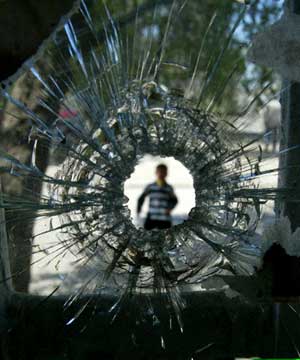
A broken window from a March 2003 airstrike by coalition forces remains in the home of Talib Aziz in Baghdad March 20, 2005. Aziz's ten-year-old son Jallal Talib was killed during the bombing. (© Faleh Kheiber/Reuters/Corbis) In the first weeks after the statue of Saddam Hussein fell, a group of young American bureaucrats led by Ambassador L. Paul Bremer III set off to establish democracy in Iraq. "We had an ambitious goal," Bremer tells FRONTLINE, "to try to bring better government to Iraq and help them rebuild their economy [and] their country." One year later, as Bremer made a secret exit to evade insurgent attacks, the group left behind a thriving insurgency, economic collapse and much of its idealism. "Our grand initiative there [was] to bring democracy to Iraq," says Rajiv Chandrasekaran, former Baghdad bureau chief for The Washington Post. Instead, says Chandrasekaran, "we were leaving with our tail between our legs." Today, as America looks for an exit strategy, FRONTLINE examines the initial, critical decisions of the U.S.-led regime in Baghdad in The Lost Year in Iraq. From the same team that produced Rumsfeld's War, The Torture Question and The Dark Side, the film is based on more than 30 interviews, most of them with the officials charged with building a new and democratic Iraq. The Lost Year in Iraq begins on April 9, 2003, as American troops help a crowd of Iraqis topple a statue of Saddam Hussein. In Washington there was celebration, but in Baghdad the looting was beginning. Jay Garner, the retired general picked by Defense Secretary Donald Rumsfeld to lead reconstruction, was forced to wait in Kuwait for authorization to enter Iraq. He and his team had arrived from Washington without computers, telephones or a plan. "Everybody was focused on the war; they were focused on regime change," Garner tells FRONTLINE. "That took all of their energy. I wasn't the central focus." On the day Garner finally arrived in Baghdad, he received a phone call from Rumsfeld: He was being replaced by L. Paul Bremer. Bremer, who arrived with sweeping plans to remake the country, had a young and inexperienced team, but his staff had passed a political litmus test in Washington. "It's a children's crusade … of former Republican campaign workers, White House interns [and] Heritage Foundation people," says Thomas Ricks of The Washington Post. Col. T.X. Hammes, a counterinsurgency expert and adviser to Iraq's Interior Ministry, felt Bremer's staff could have been better trained. "We had so many of these very, very young people that are dedicated Americans, brave enough to take a chance and go into Iraq to try to do something right for their country," he tells FRONTLINE. "But [they] didn't get any training; they have no background. … And yet we put them in charge of planning at [the] national level." Bremer surprised many in the Bush administration and the American military with far-reaching decrees that disbanded the Iraqi military and purged former Baathists from government employment. But as the insurgency grew, the administration lost confidence in Bremer and his plan for democratizing the country. Bremer was instructed to abandon his multi-year plan and transfer sovereignty as quickly as possible. "I think the situation on the ground was certainly worse than I had been led to expect, particularly the state of the Iraq economy," Bremer says. "I don't think anybody in our government realized how much damage Saddam and the Baathists had done over the previous 30 years. So to some degree, it's true that we just didn't know how complicated it was going to be." As Bremer's year in Iraq drew to a close, a blueprint for democratic elections had been put in place. At the same time the insurgency was exploding, shocking photographs had surfaced from Abu Ghraib; American and Iraqi forces had failed to put down a Sunni uprising in Fallujah; and a Shiite militia led by Moqtada al-Sadr was flexing its muscles. During his final hours on the ground, Bremer presided over the handoff of sovereignty to the Iraqi interim government and then publicly boarded a C-130 transport. Afterward, in secret, he switched to a smaller plane that would safely carry him out of the country. "The Iraqi people were, if not the enthusiastic, liberated populace that some of us had anticipated, were at least open-minded, and, on balance, prepared to work with the United States," says James Dobbins, the administration's former special envoy to Afghanistan and adviser to the Defense Department. "And that has largely been lost, and was largely lost over that first year." home | introduction | interviews | timeline | analysis | documents posted oct. 17, 2006 FRONTLINE is a registered trademark of wgbh educational foundation. | SUPPORT PROVIDED BY
|